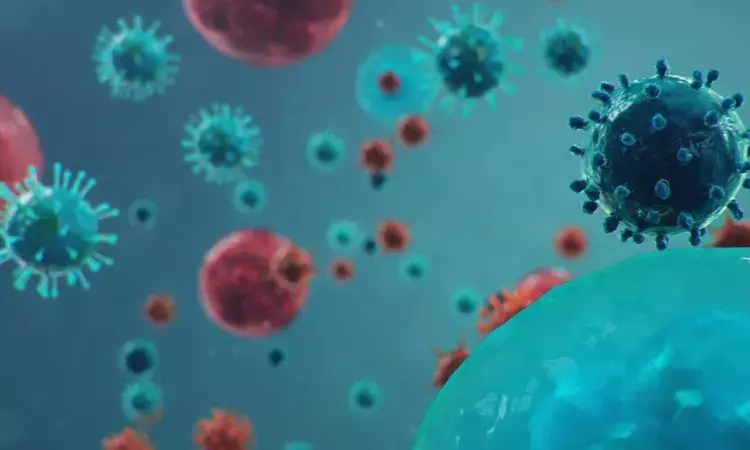- Home
- Medical news & Guidelines
- Anesthesiology
- Cardiology and CTVS
- Critical Care
- Dentistry
- Dermatology
- Diabetes and Endocrinology
- ENT
- Gastroenterology
- Medicine
- Nephrology
- Neurology
- Obstretics-Gynaecology
- Oncology
- Ophthalmology
- Orthopaedics
- Pediatrics-Neonatology
- Psychiatry
- Pulmonology
- Radiology
- Surgery
- Urology
- Laboratory Medicine
- Diet
- Nursing
- Paramedical
- Physiotherapy
- Health news
- Fact Check
- Bone Health Fact Check
- Brain Health Fact Check
- Cancer Related Fact Check
- Child Care Fact Check
- Dental and oral health fact check
- Diabetes and metabolic health fact check
- Diet and Nutrition Fact Check
- Eye and ENT Care Fact Check
- Fitness fact check
- Gut health fact check
- Heart health fact check
- Kidney health fact check
- Medical education fact check
- Men's health fact check
- Respiratory fact check
- Skin and hair care fact check
- Vaccine and Immunization fact check
- Women's health fact check
- AYUSH
- State News
- Andaman and Nicobar Islands
- Andhra Pradesh
- Arunachal Pradesh
- Assam
- Bihar
- Chandigarh
- Chattisgarh
- Dadra and Nagar Haveli
- Daman and Diu
- Delhi
- Goa
- Gujarat
- Haryana
- Himachal Pradesh
- Jammu & Kashmir
- Jharkhand
- Karnataka
- Kerala
- Ladakh
- Lakshadweep
- Madhya Pradesh
- Maharashtra
- Manipur
- Meghalaya
- Mizoram
- Nagaland
- Odisha
- Puducherry
- Punjab
- Rajasthan
- Sikkim
- Tamil Nadu
- Telangana
- Tripura
- Uttar Pradesh
- Uttrakhand
- West Bengal
- Medical Education
- Industry
People with severe mental illness at 50 per cent higher risk of death following COVID-19 infection

Two Covid Deaths in 48 Hours Raise Alarm in Ahmedabad
New research from King’s College London has found that in the UK people with severe mental illness were at increased risk of death from all causes following COVID-19 infection compared to those without severe mental illness.
Published in the British Journal of Psychiatry, the study investigated the extent to which having severe mental illness, which includes schizophrenia and psychosis, increased the risk of death during the first two waves of the COVID-19 pandemic.
Researchers at the Institute of Psychiatry, Psychology & Neuroscience (IoPPN) and ESRC Centre for Society and Mental Health analysed data from over 660,000 UK patients between February 2020 and April 2021.
Among the 7146 people with severe mental illness, there was a 50 per cent greater risk of death from all causes following COVID-19 infection compared with those without severe mental illness.
Black Caribbean/Black African people were at a 22 per cent higher risk of death following COVID-19 infection than White people, and this was similar for people with and without severe mental illness. However, in around 30 per cent of patient data, ethnicity was not recorded.
The study revealed regional differences: on average, risk of death following COVID-19 infection was higher among Northern UK regions compared to Southern regions. Those in Northern Ireland, the East Midlands and the North-East were at between 24-28 per cent increased risk of death compared to those in London.
Dr Alex Dregan, senior author and Senior Lecturer in psychiatric epidemiology at King’s IoPPN said: “We are the first group to use the Clinical Practice Research Datalink to understand the impact of COVID-19 on premature morbidity among people with severe mental illness, making this one of the largest studies of its kind Previous research has shown that these health inequalities exist but our study really demonstrates how the pandemic has exacerbated them. We now need to try to understand why this is happening and see if there is a pattern in how these people do or do not seek and access services.”
The research also found that those with more than one long-term health condition (multimorbidity) were at greater risk of death: for each additional long-term health condition, the risk of death increased by six per cent for people with severe mental illness and 16 per cent for people without severe mental illness following COVID-19 infection.
The study is part of a Health Foundation funded project called COVID-19 Ethnic Inequalities in Mental health and Multimorbidities (COVE-IMM) that is using both quantitative and qualitative methods.
Principal investigator on the COVE-IMM project and co-lead of the platform for cohorts and quantitative methods at the ESRC Centre for Society and Mental Health, and lead author Dr Jayati Das-Munshi said:
“These are stark findings and highlight the health inequalities that exist for people living with severe mental illness, people from racialised groups and people from different regions of the country. We still need to learn more about the experiences of these groups which we are doing through in-depth interview research and we also need to understand the gap in how our services provide for these vulnerable people. The pandemic shone a light on these inequalities, and we must learn from this to develop new policies and improve service provision.”
Reference:
Das-Munshi, J., Bakolis, I., Bécares, L., Dyer, J., Hotopf, M., Ocloo, J., Dregan, A. (2023). Severe mental illness, race/ethnicity, multimorbidity and mortality following COVID-19 infection: Nationally representative cohort study. The British Journal of Psychiatry, 1-8. doi:10.1192/bjp.2023.112.
Dr Kamal Kant Kohli-MBBS, DTCD- a chest specialist with more than 30 years of practice and a flair for writing clinical articles, Dr Kamal Kant Kohli joined Medical Dialogues as a Chief Editor of Medical News. Besides writing articles, as an editor, he proofreads and verifies all the medical content published on Medical Dialogues including those coming from journals, studies,medical conferences,guidelines etc. Email: drkohli@medicaldialogues.in. Contact no. 011-43720751


